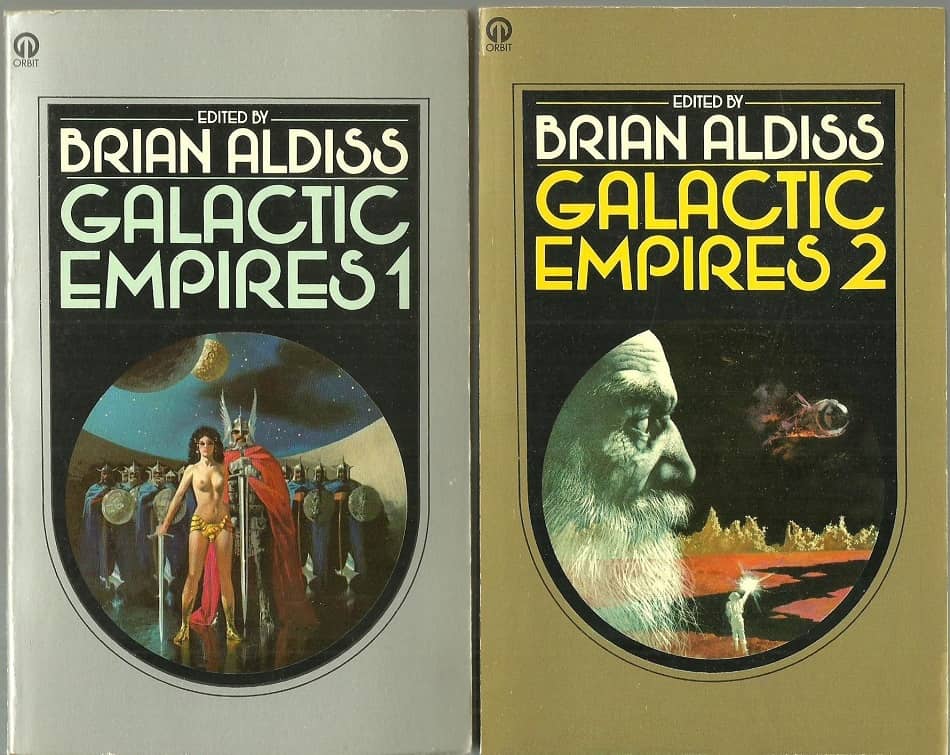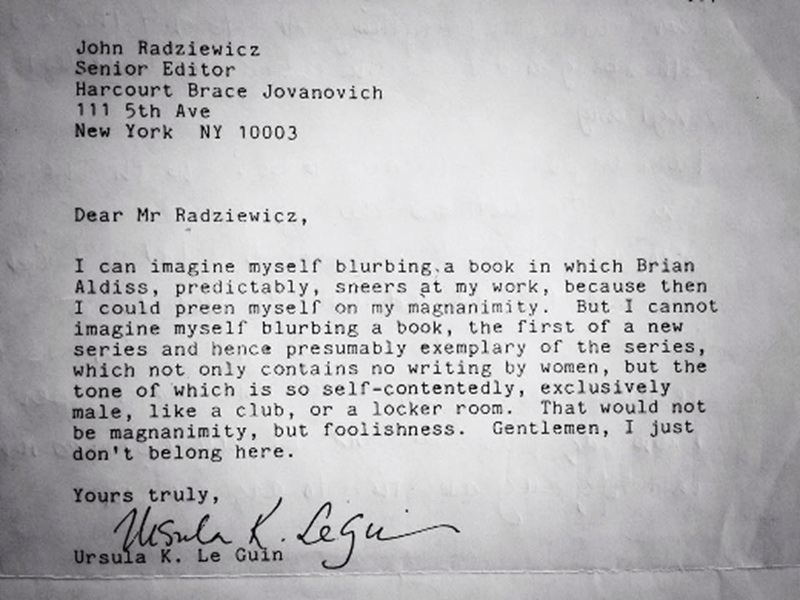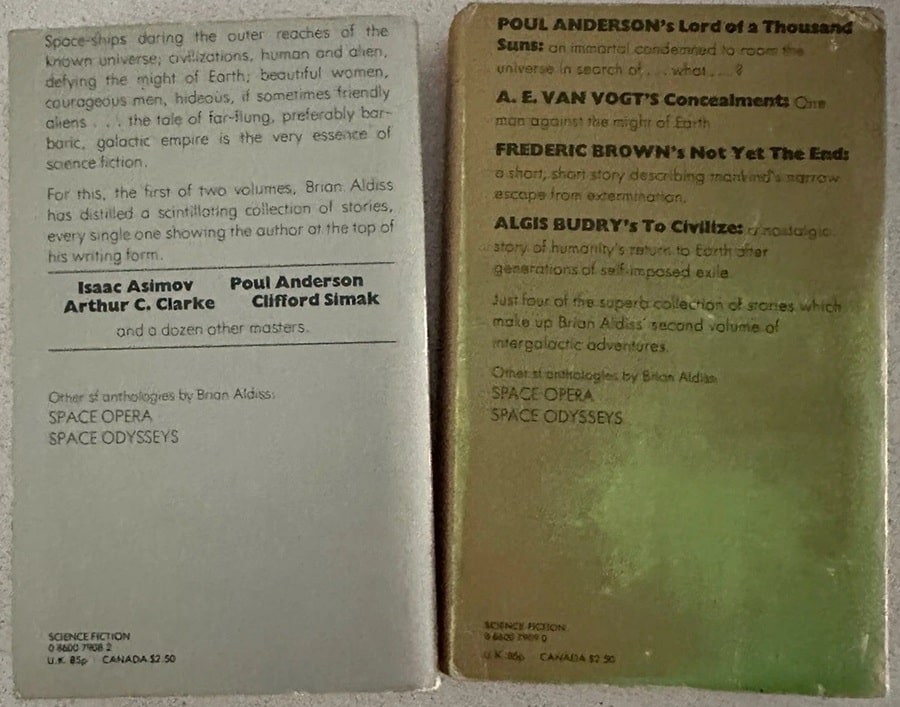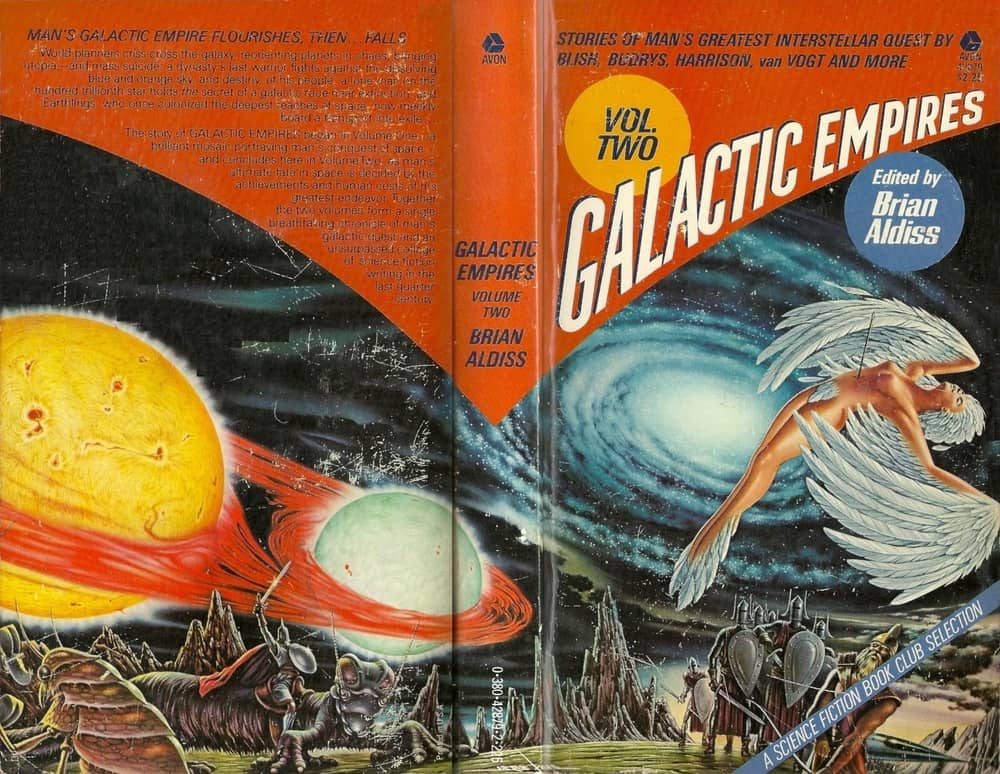Vintage Empires: James Nicoll on Galactic Empires, Volumes One & Two, edited by Brian W. Aldiss

My fellow Canadian James Nicoll continues to be one of my favorite SF bloggers, probably because he covers stuff I’m keenly interested in. Meaning exciting new authors, mixed with a reliable diet of vintage classics.
In the last two weeks he’s discussed Kate Elliots’s The Witch Roads, Axie Oh’s The Floating World, Ada Palmer’s Inventing the Renaissance, and Emily Yu-Xuan Qin’s Aunt Tigress, all from 2025; as well as Walter Jon Williams The Crown Jewels (from 1987), Wilson Tucker’s The Long Loud Silence (1952), C J Cherryh’s Port Eternity (1982), and John Brunner’s 1973 collection From This Day Forward. Now that’s a guy who knows how to productively use his leisure time. Not to mention caffeine.
But my favorite of his recent reviews is his story-by-story breakdown of Brian W. Aldiss’s massive two-volume anthology Galactic Empires, which made me want to read the whole thing all over again.
James opens by reprinting the famous letter Ursula K. Le Guin sent to Harcourt senior editor John Radziewicz, when she was asked to provide a blurb for Volume 1 of George Zebrowski’s new anthology series Synergy: New Science Fiction. It didn’t go well.

As James notes,
Modern readers might be surprised at the almost complete lack of women in the two volumes (or they would be, if the books were not long out of print). Older readers, aware of Le Guin’s response to a later Aldiss-helmed anthology, will be less surprised.
On to the stories.

James covers every one of the stories in this massive anthology. Here’s the highlights.
VOLUME ONE
I remembered Volume Two as the stronger of the two. That’s not quite correct. Both have their weak stories (“Foundation,” in the absence of other material, “Escape to Chaos,” not to mention that terrible van Vogt story) but both have works such as “Brightness Falls from the Sky” and “Final Encounter” that I enjoyed encountering again…
“The Star Plunderer” • (1952) • novelette by Poul Anderson — a Technic History story
Alien slavers descent on decadent, weak Earth, little suspecting that their actions will provoke the rise of the TERRAN EMPIRE! The guy does not get the girl. There are enough Anderson Guy Doesn’t Get the Girl stories for an anthology. I wonder why?
“Foundation” (1942) • novelette by Isaac Asimov — a Foundation tale
Endangered due to the slow collapse of the Empire, the Encyclopedists on distant Terminus discover the true reason that their science colony was founded. Without the context of the other Foundation stories, this one seems oddly anti-climactic. Yet it seems to have been wildly popular back when.
“Resident Physician” (1961) • novelette by James White — a Sector General story
What led a terribly ill immortal alien to turn on its physician? And can the staff of Sector General solve the mystery, given they’ve never previously encountered this species? One has to admire how calmly the staff of Sector General take being presented with what amounts to a demigod, especially an angry, apparently homicidal demigod. One of the principal characters in Sector General stories is psychology section-head Major O’Mara, described thusly:
“(O’Mara) was also, on his own admission, the most approachable man in the hospital. O’Mara was fond of saying that he didn’t care who approached him or when, but if they hadn’t a very good reason for pestering him with their silly little problems then they needn’t expect to get away from him again unscathed.”
Has anyone ever proposed a Sector General TV show with Hugh Laurie playing O’Mara?
“Planting Time” • (1975) • short story by Pete Adams and Charles Nightingale
A starfarer stumbles across a potentially profitable and most certainly lascivious previously unknown lifeform. People in the 1970s were extremely horny. No, even hornier than that. However, many men didn’t especially care for that whole needing to chat up partners first nonsense.

VOLUME TWO
“Down the River” • (1950) • short story by Mack Reynolds
Humans are, in order, astonished to discover they are subjects of a galactic empire, offended that they are being traded from one empire to another, and alarmed by revelations concerning their new masters. This is an example of a “how would you feel if what you routinely do to others was done to you?” story. It’s not subtle because readers would miss the point if it were and probably most of them did, anyway.
“Final Encounter” • (1964) • short story by Harry Harrison
In the thousand centuries since faster than light drive gave humanity the stars, humans have never encountered intelligent aliens. Now on the far side of the Milky Way, they have. Or so it seems. Whether or not the odd beings are human or not turns out to be surprisingly easy to determine with a simple DNA test, so the big puzzle about which the story is constructed is easily resolved. What I found fascinating as a kid was how Harrison understood that due to the sheer size of the Milky Way (to quote George R. R. Martin):
“There are many ways to move between the stars, and some of them are faster than light and some are not, and all of them are slow.”
“Lord of a Thousand Suns” • (1951) • novelette by Poul Anderson
Humanity’s fate depends on a technological ghost left by a long-dead, all-powerful alien civilization. Anderson is the author I depend on to grasp space and time’s scales, so it’s odd and distracting that his protagonist seems convinced that dinosaurs walked the Earth only a million years ago.
“Big Ancestor” • (1954) • novelette by F. L. Wallace
Many worlds have human races, and while some are more highly evolved than others, all are clearly kin. What glorious race planted colonies in the long-forgotten past? The answer is astounding! Well, technically, the answer is galactic, as this story appeared in Galaxy, not Astounding.
The full review is well worth your time. Check it out here, and do yourself a favor and make it a habit to stop by James’ blog here.
We covered both volumes of Galactic Empires as a Vintage Treasure way back in December 2021.
Maybe it’s finally time for me to revisit these two?
My favorite of Mr. Aldiss’s anthologies was his compilation of derring-do in spaaaaace!, Space Opera. But Galactic Empires was a close second.